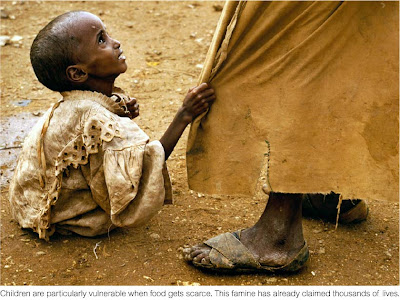Two regions of Somalia were yesterday officially classified as in famine. UNICEF's chief says this story should get more space than the hacking scandal. Is he right?
Habiba has travelled to Mogadishu, the capital of Somalia, from a village in the south-west of the country. She walked 200 km. Her five children were walking with her, but the two youngest, aged two and five, died on the way. She says she abandoned their bodies along the roadside because she was too weak to dig them graves.
These are just two of the tens of thousands who have already died in the disaster gripping the Horn of Africa. The crisis was yesterday upgraded to famine status. How has the situation come to this?
Somalia is a country of nine million on the east coast of Africa. For the last two years the rains have failed, causing drought. This is in part due to normal weather patterns, but may have been made worse by climate change.
But that isn't the whole story. Somalia is a political mess. It has not had an effective national government in 20 years – instead the country is controlled by various armed groups. Islamist Al Shabaab controls much of the country's south, and is defined by the US as a terrorist group.
The group ordered all aid workers out of the country in 2009, labelling them 'infidels.' In spite of recently announcing they will let aid in, Al Shabaab's intentions are unclear. In the past they have 'taxed' aid, essentially stealing it, have refused to allow female or foreign relief workers, and are currently threatening those programmes they believe to be favouring other factions.
Al Shabaab's presence means the US has slashed aid to Somalia for fear of funding terrorists. Oxfam has called some EU states' slow response 'wilful neglect'. A UK pledge of £90 million in food aid, and private donations of £20 million are not enough.
UK concern for the famine may have been low due to lack of media coverage: UNICEF yesterday took out full page newspaper advertisements asking readers to 'move the news agenda on' from the tabloid phone hacking scandal dominating the British media onto 'another, far bigger and vital story'.
Neglect and apathy
Perhaps UNICEF is right. Yesterday's Guardian had 12 pages on the hacking scandal. Is this, a media story about the media, just journalists self-obsessing? Ironically, in focusing on News of the World failing to act correctly, journalists are potentially again neglecting their duties, this time to report what the world needs to know: the first major famine of the 21st Century.
Or perhaps it is unfair of David Bull, the fund's director, to suggest that famine is more newsworthy. While we should care about the thousands dying in Africa, is it natural to be apathetic about a disaster so difficult to relate to and so far from home, when there are dramatic goings on that affect our lives, here on our doorstep?


No comments:
Post a Comment